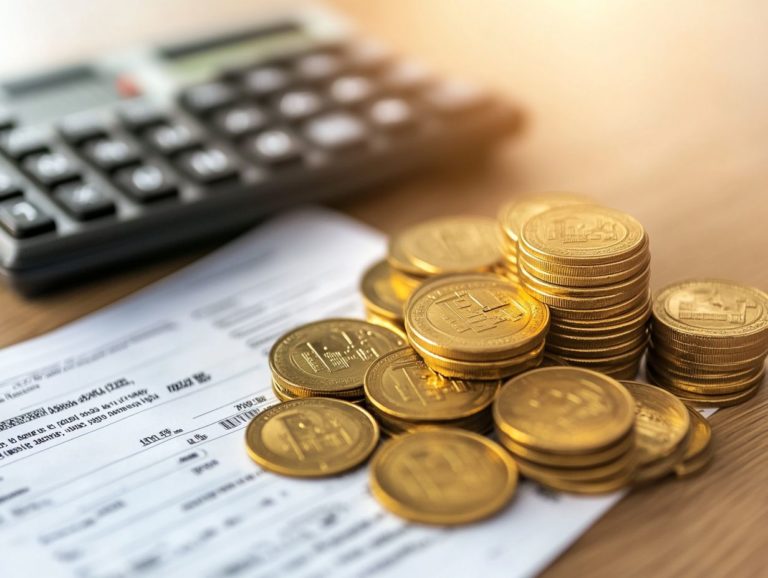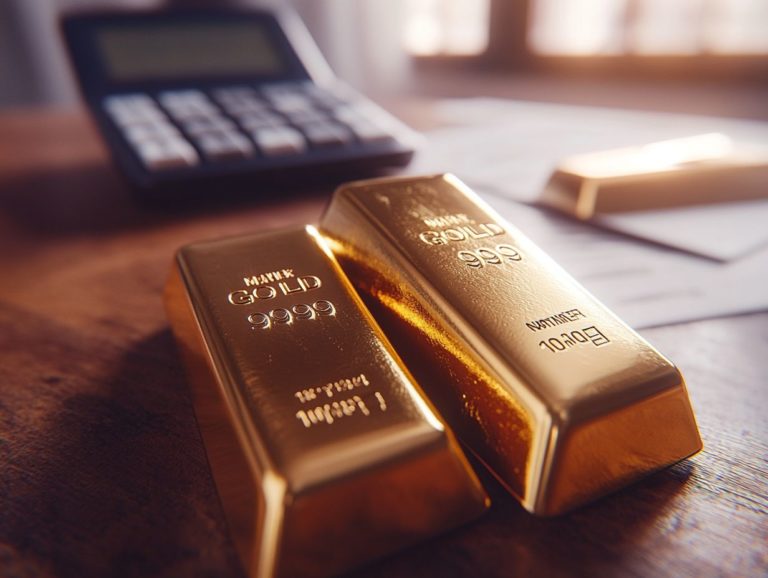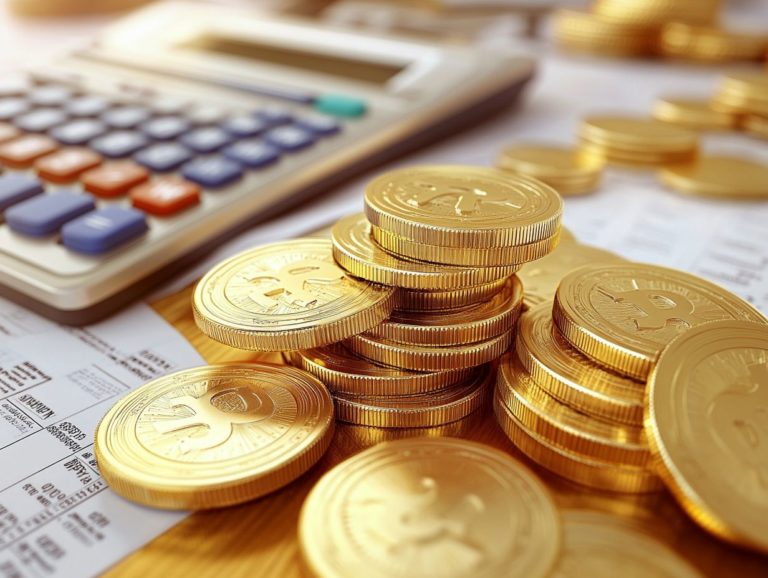Understanding the Tax Obligations of Precious Metals
Get ready to explore the exciting world of precious metals and their tax implications! Investing in precious metals can indeed be a lucrative venture, but it comes with tax obligations that you need to fully understand.
This article will guide you through various tax implications associated with owning gold, silver, and other precious assets. We ll cover everything from the types of taxes you may encounter to the reporting requirements established by the IRS.
You ll discover strategies to maximize your tax benefits and consider international tax implications. Prepare to navigate the financial landscape of precious metals with the confidence and knowledge you deserve!
Contents
- Key Takeaways:
- Tax Implications of Owning Precious Metals
- Reporting Requirements for Precious Metals
- IRS Reporting Rules and Regulations
- Tax Strategies for Investing in Precious Metals
- Maximizing Tax Benefits
- International Tax Considerations for Precious Metals
- Tax Laws in Different Countries
- Frequently Asked Questions
- What are the tax obligations for owning precious metals?
- Do I need to pay taxes on my precious metals if I haven’t sold them?
- How do I report my precious metals transactions?
- What should I do if I receive an audit notice?
- Are there any tax exemptions for precious metals?
- How can I minimize my tax obligations for precious metals?
- What happens if I inherit precious metals?
- Do I need to report my precious metals on my tax return?
Key Takeaways:
- Precious metals, such as gold and silver, are considered tangible assets and are subject to different tax obligations than traditional investments.
- Owning precious metals may incur taxes such as capital gains tax and sales tax, depending on the type of metal and how it was acquired.
- It’s important to understand and comply with IRS reporting rules and regulations when buying, selling, or holding precious metals for investment purposes.
What are Precious Metals?
Precious metals think gold, silver, platinum, and palladium are not just rare and valuable; they possess unique characteristics that set them apart.
Their diverse industrial uses, from jewelry to electronics, and their role as reliable inflation hedges make them highly sought after.
These durable metals hold intrinsic value, making them enticing investment options for both individuals and institutions. Their remarkable resistance to corrosion and exceptional conductivity positions them as essential materials in high-tech applications.
At the same time, their aesthetic allure fuels demand in the luxury market. In the automotive sector, platinum and palladium are essential, playing vital roles in catalytic converters.
Economically, these metals act as a safe haven during market downturns, often appreciating in value when other assets are in flux. This fascinating interplay of functionality and investment allure highlights their global significance, impacting everything from currency valuation to geopolitical dynamics.
Tax Implications of Owning Precious Metals
Owning precious metals can carry notable tax implications, especially regarding capital gains tax, which applies to the investment returns when you sell these valuable assets.
Understanding concepts like cost basis (the amount you paid for the metal), fair market value (the current selling price), and other financial nuances will enable you to make informed decisions that minimize your tax liability.
Types of Taxes on Precious Metals
As an investor in precious metals, you must navigate a landscape filled with various taxes. These include capital gains tax on selling prices, collectibles tax for specific items, and applicable tax rates that could change based on your circumstances and investment strategies.
Capital gains tax typically kicks in when you sell these assets for more than you paid. Remember that the rate can vary depending on how long you’ve held the metals.
Certain items, especially coins classified as collectibles, may attract a higher collectibles tax, currently capped at a maximum rate of 28%. Also, consider any exemptions, such as those for IRA-held precious metals, which can offer significant tax advantages when structured properly.
Being aware of these regulations and planning your approach accordingly can profoundly impact your overall investment profitability.
Reporting Requirements for Precious Metals
The IRS requires you to adhere to specific reporting guidelines for your precious metals investments. This often necessitates the completion of IRS Form 8949 and Schedule D to accurately document sales transactions and related tax deductions.
Maintaining meticulous accounting records is crucial for compliance and can provide significant benefits for you as an investor over time.
Understanding these tax rules is critical for your investment success. Don t wait until it’s too late! Stay informed about your tax obligations and consider consulting a tax professional.
IRS Reporting Rules and Regulations
The IRS has laid out specific reporting rules and regulations that dictate how you must report your transactions as an investor in precious metals. Utilizing IRS Form 8949 and Schedule D is essential for understanding tax impacts and ensuring your compliance.
Understanding these reporting requirements is crucial for your success! If you re engaged in investments in precious metals, you need to accurately report each transaction when filling out IRS Form 8949. This includes capturing details such as the date acquired, date sold, sale proceeds, and cost basis (the original value of your investment).
Schedule D serves to summarize these transactions, aiding in the determination of any realized gains or losses. Ignoring these guidelines could lead to severe penalties, including substantial fines or even an audit.
Thus, staying informed about these rules will help you report correctly and maximize your investment returns while mitigating the risks associated with non-compliance.
Tax Strategies for Investing in Precious Metals
Implementing effective tax strategies for investing in precious metals allows you to significantly minimize tax liabilities while optimizing your investment decisions and returns.
Using strategies like offsetting gains and seeking expert advice is essential for navigating the complexities of precious metal investments.
A proactive approach safeguards your assets and enhances your overall financial performance.
Maximizing Tax Benefits
Maximizing your tax benefits when investing in precious metals requires a savvy approach to tax deductions. You also need a clear understanding of the tax implications associated with various investment strategies to enhance your returns.
By familiarizing yourself with the intricacies of tax codes, you can strategically choose which investment vehicles to utilize, ultimately benefiting from a lower taxable income.
For example, leveraging tax-deferred accounts or taking advantage of favorable capital gains treatment can significantly optimize your overall investment portfolio.
Furthermore, carefully assessing the timing of asset sales and strategically capitalizing on potential losses can elevate your returns and enrich your financial strategy.
Recognizing these key elements enables you to adopt a more robust investment approach, ensuring that each decision you make contributes to your long-term financial goals while effectively minimizing your tax liabilities.
International Tax Considerations for Precious Metals
You should be acutely aware of the international tax considerations when engaging with precious metals. Tax laws vary considerably from one country to another, and these differences can significantly influence your investment options and strategies.
Tax Laws in Different Countries
Tax laws surrounding precious metals can vary significantly from one country to another, influencing how you approach your investments and the strategies you implement in response to different governmental regulations.
For example, in the United States, precious metals are viewed as collectibles and are subjected to a higher capital gains tax rate. This situation might lead you to contemplate long-term holding strategies or even diversifying your portfolio to mitigate tax liabilities.
Conversely, in countries like Canada, silver and gold are often treated more favorably, allowing for tax-free gains if held in registered accounts.
As you navigate these diverse tax frameworks, consider using local dealers to minimize sales taxes or exploring jurisdictions with more advantageous treatment of precious metals. These factors not only shape your investment decisions but also play a significant role in the broader market dynamics of precious metals on a global scale.
Frequently Asked Questions
What are the tax obligations for owning precious metals?
The tax obligations for owning precious metals vary depending on the type of metal and the country in which it is being owned. Generally, any gains from selling precious metals are subject to capital gains tax.
Do I need to pay taxes on my precious metals if I haven’t sold them?
In most cases, you are not required to pay taxes on your precious metals if you have not sold them. However, if you own a large amount of precious metals, you may be subject to wealth or property taxes.
How do I report my precious metals transactions?
To report your transactions, use IRS Form 8949 to detail each sale and Schedule D to summarize your overall gains and losses.
What should I do if I receive an audit notice?
If you receive an audit notice, consult a tax professional immediately to ensure you respond correctly and provide the necessary documentation.
Are there any tax exemptions for precious metals?
Some countries offer tax exemptions for precious metals like gold coins or bars.
Research the tax laws in your area to see if any exemptions apply to you.
How can I minimize my tax obligations for precious metals?
You can minimize your tax obligations by holding precious metals in a tax-advantaged account.
An Individual Retirement Account (IRA) is a great option for this.
What happens if I inherit precious metals?
Inheriting precious metals could mean tax obligations, and you need to be prepared!
Consult a tax professional for guidance on handling tax implications.
Do I need to report my precious metals on my tax return?
In most cases, you don t need to report your precious metals unless you ve sold them and made a profit.
Don t wait! Consult a tax professional now to ensure you re reporting your taxes correctly.













